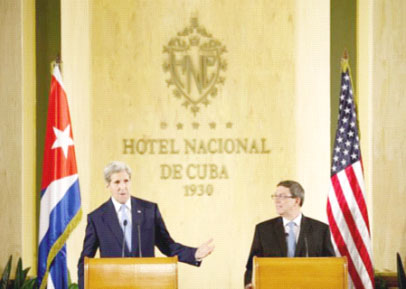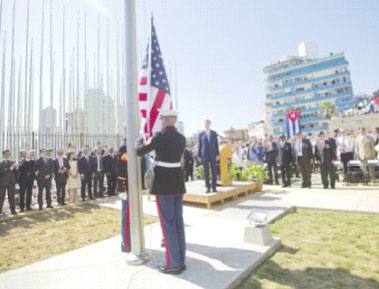HAVANA, (Reuters) – U.S. Secretary of State John Kerry called for political change in Cuba yesterday, telling Cubans they should be free to choose their own leaders, as he watched the U.S. flag fly at the American embassy in Havana for the first time in 54 years.
Leading a ceremony to mark the restoration of diplomatic relations be-tween the Cold War adversaries, Kerry declared a new era in U.S.-Cuban relations but pressed the Communist government on democracy and human rights.

“We remain convinced the people of Cuba would be best served by a genuine democracy, where people are free to choose their leaders,” he said in a one-party state where the media is tightly controlled and political dissent is repressed.
“We will continue to urge the Cuban government to fulfill its obligations under U.N. and Inter-American human rights covenants,” Kerry said, his words accurately translated into Spanish and broadcast live on Cuban state television.
His comments drew a firm riposte from Cuban Foreign Minister Bruno Rodriguez, who defended Cuba at a news conference with Kerry and criticized the United States’ own record on rights, referring to racial strife and police brutality in America.
Speaking later with reporters, Kerry said the U.S. Congress was unlikely to lift a punishing economic embargo on Cuba unless human rights improved.
“There is no way Congress is going to vote to lift the embargo if they’re not moving with respect to issues of conscience,” said Kerry, who in the first visit to Cuba by a U.S. secretary of state in 70 years met for about an hour with some of the country’s most prominent dissidents.

Cuba fiercely rejects such conditions and it declined to attend a U.S. reception where the dissidents were present.
Josefina Vidal, Cuba’s lead negotiator in talks on restoring diplomatic relations, told Reuters that Cuba’s sovereignty was not negotiable and Cuba has no interest in placating its enemies in the United States.
“We are not going to make a decision to try to please or respond to people who don’t want our well-being,” Vidal said in an interview. “Cuba will never do anything, nor will it move its position one millimeter to try to respond.”
While the tone in U.S.-Cuban relations has improved greatly since detente was announced in December, the blunt statements and rebukes underscored how far the two countries are from normal relations after decades of hostilities that outlived the Cold War.
Both sides stressed Friday that the path toward normalization of overall relations would be lengthy and suffer occasional setbacks.
Cuba wants the United States to end its economic embargo of the island, return the U.S. naval base at Guantanamo Bay in eastern Cuba and halt radio and television signals beamed into Cuba.
The United States is seeking the return of fugitives granted asylum in Cuba and backs the claims of Americans whose property was nationalized in the years after Fidel Castro seized power in a 1959 revolution.
SUN SHINES ON SEASIDE CEREMONY
The sunlit ceremony at the embassy overlooking the Malecon, the broad esplanade along Havana’s seafront, was a major symbolic step on a path that opened last December when President Barack Obama and President Raul Castro announced they would seek to normalize ties.
Three retired Marines who last lowered the flag in 1961 took part in the ceremony, handing a new flag to the Marine Color Guard.
As the flag was raised, there were loud cheers and applause from the crowd of U.S. and Cuban dignitaries and longtime proponents of U.S.-Cuban engagement, and from people watching from neighboring balconies.
The United States and Cuba formally renewed diplomatic relations and upgraded their diplomatic missions to embassies almost four weeks ago. While the Cubans celebrated with a flag-raising in Washington on July 20, the Americans waited until Kerry could travel to Havana.





